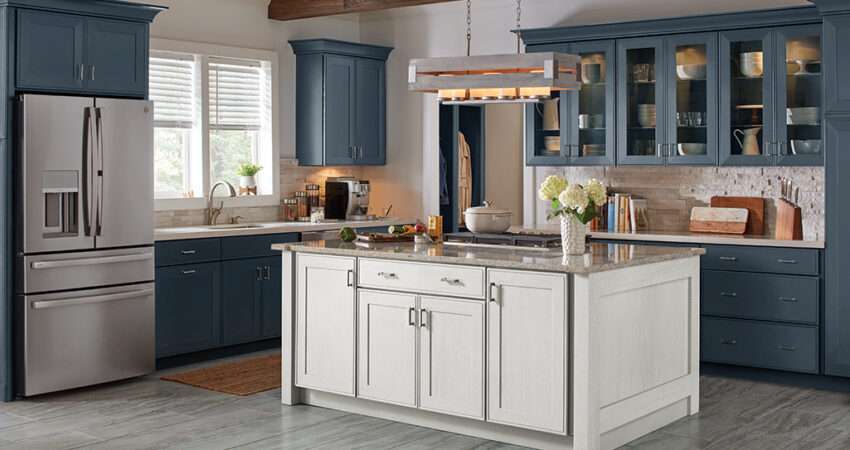Material Innovations in Countertops: Quartz vs. Granite vs. Solid Surface
Countertops are one of the most important features in kitchens, bathrooms, and commercial spaces. They set the tone for design, influence functionality, and directly impact daily use. In recent years, material innovations in countertops have expanded choices beyond traditional stone, offering consumers a balance between beauty, performance, and sustainability.
This article explores the differences between quartz, granite, and solid surface countertops, highlights advancements in engineered stone, and compares heat, scratch, and stain resistance to help you make an informed decision.
Quartz Countertops: Engineered Durability
Quartz countertops are manufactured from crushed quartz crystals bound with resins and pigments, creating an engineered stone that combines the beauty of natural rock with consistent design. This makes quartz one of the most versatile and reliable modern countertop materials.
Key Advantages of Quartz:
- Non-porous surface: Resists stains from coffee, wine, oils, and even harsh chemicals.
- Low maintenance: No sealing required, unlike granite.
- Design versatility: Available in a wide range of colors, finishes, and patterns - including marble-like veining or concrete-inspired industrial looks.
Quartz is very durable when it comes to everyday use. However, it’s not indestructible. Cutting directly on quartz can leave scratches, so a cutting board is still recommended. In terms of heat resistance, quartz can withstand moderate temperatures, but placing hot pans directly on the surface may cause thermal shock or resin discoloration.
For busy households or commercial kitchens where maintenance needs to be minimal, quartz offers an outstanding balance of durability and convenience.
Granite Countertops: Natural Beauty with Strength
Granite has long been a favorite for those who appreciate natural beauty. Each slab is unique, with patterns of veins, specks, and swirls that cannot be replicated in engineered stone.
Strengths of Granite:
- High heat resistance: Can withstand hot pots and pans better than quartz or solid surface.
- Scratch resistance: Extremely durable against everyday wear.
- Natural aesthetics: Adds timeless elegance and often boosts property value.
The main drawback is maintenance. Because granite is naturally porous, it requires regular sealing to prevent oils and liquids from seeping in. Neglecting sealing can lead to staining and bacterial growth.
From a sustainability standpoint, granite is a natural resource with a long lifespan, but quarrying and transportation - often across continents - can carry a significant environmental footprint.
Granite is an ideal choice for homeowners who want a unique, high-performance natural material and don’t mind some ongoing care.
Solid Surface Countertops: Seamless and Repairable
Solid surface countertops, made primarily from acrylic and polyester blends, were developed to provide a more customizable and practical alternative to natural stone. Brands like Corian brought them into mainstream design for both residential and commercial use.
Benefits of Solid Surface:
- Seamless design: Joints are virtually invisible, creating smooth expanses of surface. Perfect for large kitchens, commercial counters, or integrated sinks.
- Repairable: Scratches, burns, or chips can often be sanded out or repaired by professionals.
- Wide range of colors: Consistency in tone and design makes it a good option for modern or minimalist spaces.
Solid surface is not as resistant to heat or scratches as quartz or granite. Hot pans and sharp knives can cause permanent marks. However, it excels in hygienic environments like hospitals, restaurants, and labs, where its non-porous, easy-to-clean qualities make it practical and safe.
Engineered Stone and Sustainability
One of the biggest drivers of innovation in countertops today is sustainability. As eco-conscious design grows in popularity, manufacturers are incorporating recycled and renewable content into their products.
Examples of Eco-Friendly Practices:
- Recycled glass and reclaimed stone: Incorporated into some quartz products.
- Low-VOC resins: Improve indoor air quality by reducing off-gassing.
- Local manufacturing: Cuts down on the emissions associated with quarrying and overseas shipping.
- Take-back programs: Some solid surface brands recycle old countertops into new material.
When compared to natural granite - which requires heavy extraction - engineered materials can often be more environmentally responsible, especially when they incorporate recycled content and sustainable practices.
Heat, Scratch, and Stain Resistance: A Comparison
When choosing a countertop, performance under daily use is often the deciding factor. Here’s how quartz, granite, and solid surface compare:
Heat Resistance
- Granite: Excellent - withstands hot cookware without damage.
- Quartz: Good - resists heat, but resin may discolor under extreme temperatures.
- Solid Surface: Fair - prone to burns if hot pans are placed directly on the surface.
Scratch Resistance
- Granite: Very high - tough against sharp objects, though not invulnerable.
- Quartz: High - durable, but knives can still leave marks.
- Solid Surface: Moderate - scratches more easily, but repairable with sanding.
Stain Resistance
- Quartz: Excellent - non-porous and resists most spills.
- Granite: Good when sealed; porous if unsealed.
- Solid Surface: Very good - resists most stains, but may show discoloration over time.
Design Considerations
Beyond performance, design plays a huge role in countertop selection.
- Edge Profiles: Choices like beveled, bullnose, or waterfall edges can dramatically change the look.
- Finishes: Matte, polished, or textured finishes create different aesthetics and practical effects.
- Integration: Solid surface excels in integrated sinks and backsplashes, while quartz and granite are often chosen for standout island slabs.
Cost and Value Considerations
- Quartz: Mid- to high-range cost, but excellent long-term value due to low maintenance.
- Granite: Wide price range, depending on rarity of the stone. Offers resale value appeal.
- Solid Surface: Generally less expensive than quartz or granite, with repairability as a cost-saving advantage.
When factoring in installation, sealing, and maintenance, quartz and solid surface often cost less long-term compared to granite, which requires sealing and occasional repair.
Residential vs. Commercial Applications
- Residential Kitchens: Quartz is popular for its low maintenance; granite for its natural luxury.
- Bathrooms: Solid surface is favored for integrated sinks and seamless vanity designs.
- Commercial Spaces: Solid surface often dominates in hospitals, labs, and restaurants, where hygiene and seamless surfaces are crucial.
Choosing the Right Countertop
Ultimately, the best countertop depends on your lifestyle and priorities:
- For low maintenance and stain resistance, quartz is often the preferred choice.
- For natural beauty and unmatched heat resistance, granite is the go-to.
- For seamless design and easy repair, solid surface materials are ideal.
Thanks to innovations in engineered stone and sustainability, homeowners and designers no longer need to compromise between function and aesthetics.
FAQs About Countertop Materials
1. What is the most durable countertop material?
Granite and quartz both rank highly for durability. Granite excels in heat resistance, while quartz is better at resisting stains.
2. Do quartz countertops need to be sealed?
No. Quartz is non-porous and requires no sealing, unlike granite.
3. Can solid surface countertops be repaired if damaged?
Yes. Scratches, burns, and chips can usually be sanded or buffed out by a professional.
4. Which material is most eco-friendly?
Engineered quartz and some solid surface products with recycled content are generally more sustainable than quarried granite.
5. What is the cost difference between quartz, granite, and solid surface?
- Solid surface: typically most affordable.
- Quartz: mid to high range, with long-term value from minimal upkeep.
- Granite: can be mid-range to premium, depending on rarity of the slab.
Final Thoughts
Countertop materials continue to evolve, blending performance, sustainability, and design innovation. Whether you choose quartz, granite, or solid surface, each material offers distinct strengths in durability, maintenance, and style.
By understanding differences in heat, scratch, and stain resistance - and considering sustainability and cost - you can make a long-lasting investment tailored to your lifestyle. With so many innovations, today’s countertops allow homeowners, designers, and businesses to achieve the perfect balance of function and beauty.

